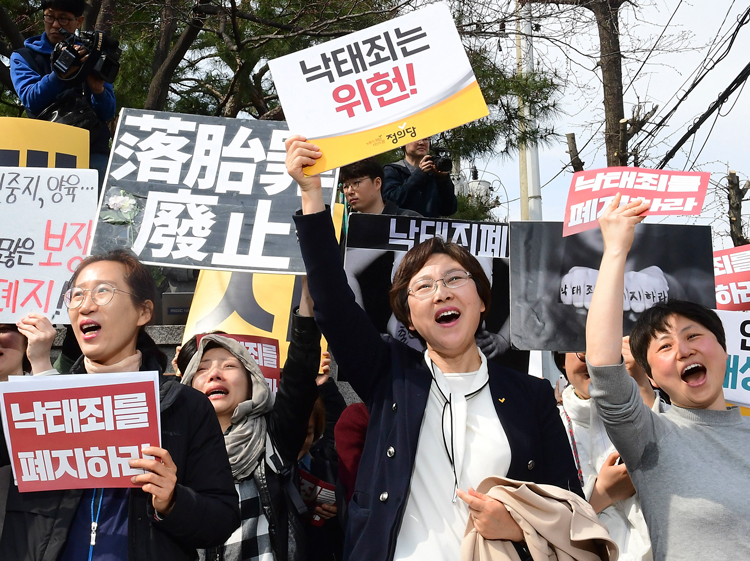Cheers erupted from hundreds of demonstrators chanting “New world! Right now!” outside South Korea’s Constitutional Court in Seoul April 11 when the justices ruled 7-2 that a 66-year-old law banning abortion was unconstitutional. The court majority said the anti-abortion law “violates a pregnant woman’s right to choose.”
“The ruling is an achievement for women who have fought for their rights on the streets,” Na-young, who has helped lead groups fighting for women’s rights, told the rally. “It is a chance to change history.”
The anti-woman law, instituted in 1953 on the heels of the Korean War, denies abortion except in cases of rape, incest or if the mother’s health is at risk. And those exceptions apply only for married women, who still need their husband’s or partner’s permission.
The verdict came after years of demonstrations and protests in South Korea by working people and women’s rights organizations in support of women’s right to choose. A challenge to the law in 2012 was rejected by the court. But over the last decade there has been a marked shift in views on legalization of abortion.
According to a recent poll, the proportion of South Korean men and women favoring legal abortion rose to 58% in 2019 from 34% at the start of the decade. And among women, support now polls at 75%.
“Now a woman can be respected for her own decision about her body,” Lee Yu-rim from the Sexual and Reproductive Rights Forum told the rally. Lee said the decision sets an “historical milestone” that “calls an end to threats and reprisals that women faced” when choosing to have an abortion.
The court stopped short of immediately terminating the law, keeping it in place until lawmakers pass new legislation reflecting their ruling by the end of 2020. The judges said this would allow for a law that took into account different stages of pregnancy.
Under the law, a woman could be fined heavily or jailed for a year for having an abortion, and doctors performing the procedure can face up to two years in prison. But despite its illegality, hundreds of thousands of South Korean women have had an abortion and the ban has gone largely unenforced.
In 2017 over 49,000 abortions took place in South Korea, nearly 94% illegally. That year 25 cases involving abortions went to trial, with four convictions.
“Everyone has one or two in their family — your mother, sister, sister-in-law,” Nam Sung-ah, a counselor at a sexual violence victims’ support center, told the Los Angeles Times at the rally. “Everyone was forced to be hush-hush about it.”
“When you live in a rural area and you are underage, it’s hard for you to find a doctor that is willing to perform the operation,” Ryu Min-hee, a lawyer in the case, told the GlobalPost. Fees in the countryside can be higher.
“Advocates say the ban makes women seeking abortions vulnerable to reprisals; boyfriends, former boyfriends, husbands and in-laws have reported women to the police,” the New York Times reported.
Rulers pushed to control family size
Historically, abortions have been encouraged or discouraged by the South Korean government based on the capitalist rulers’ needs for population growth. “In the 1960s and ’70s, the national government ran numerous ‘family planning’ campaigns in hopes that reducing the population would address post-war poverty,” GlobalPost wrote. This effort continued in the 1970s and ’80s, when the government promoted slogans like, “It’s too crowded in Korea” and “Even two is too much.”
But by 2016, when the population growth fell from 6.1 children per woman in the 1960s to 1.12, the government shifted position. It announced a “comprehensive plan” to raise the birthrate, including a crackdown on abortions.
This past February a coalition of women’s groups campaigning for abortion rights issued a statement reading in part, “When there were too many people, they told us ‘not to produce babies’ in the name of family planning, and when they thought there were not enough people, they then told us ‘to produce babies’ or face punishment.”
Women need legal access to medical facilities that offer family planning, including the ability to have a safe and secure abortion. The right of women to control their own bodies — to choose whether to bear children, when and how many — is a precondition for women’s emancipation.
The victory in South Korea is a step forward.


